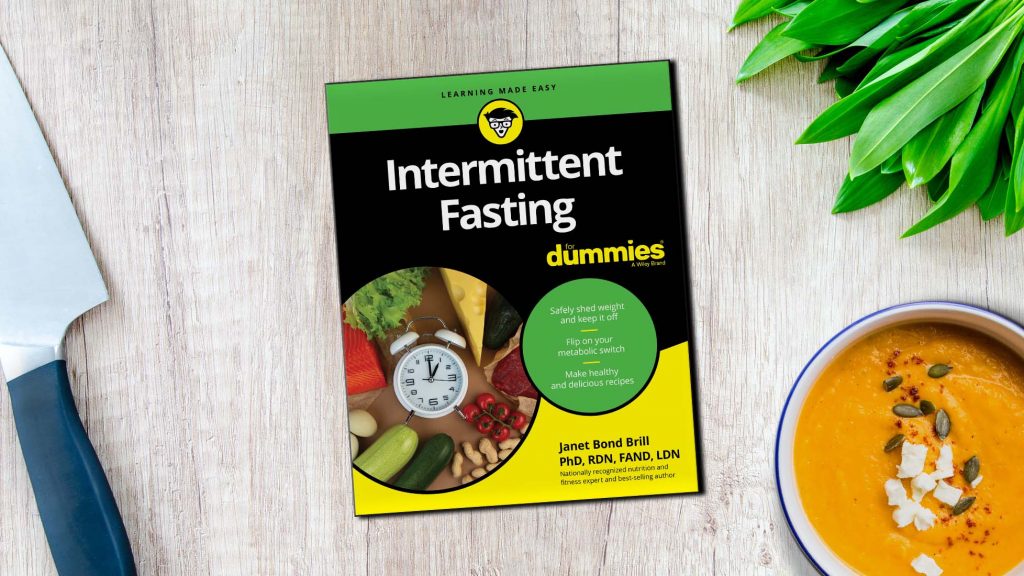Intermittent Fasting For Dummies by Dr. Janet Bond Brill, RDN, FAND, LDN
Dr. Janet Bond Brill, an internationally recognized health expert, and disease prevention specialist talks about her new book, Intermittent Fasting for Dummies that releases on November 17, 2020. The book is designed to make it easy for readers to choose the intermittent fasting method that suits them to have a leaner, healthier, and longer life. Want to learn more about intermittent fasting? Read Dr. Janet’s interview to get started.
Dr. Janet Bond Brill, could you explain Intermittent Fasting to those of us who only heard it used by health fanatics?
Intermittent fasting is an eating pattern that cycles between periods of short-term fasting and eating. Unlike traditional diets, intermittent fasting doesn’t restrict what foods a person should eat. Rather, it dictates when to eat and cycles periods of fasting with normal eating. There are multiple intermittent fasting diet plans circulating. All of them dictate when you should eat rather than what specific foods you should eat. One popular version, called the 16:8 method, means you fast for 16 hours every day and eat during your chosen 8-hour eating window. You repeat this pattern of eating every day. I outline step-by-step instructions on how to follow the 5 most popular methods of intermittent fasting in my book; Intermittent Fasting For Dummies.
What was the most surprising discovery while researching intermittent fasting?
The fact that the mainstream medical world is supporting intermittent fasting to achieve better health. In fact, intermittent fasting was the topic of a lengthy review article recently published in the prestigious medical journal, the New England Journal of Medicine.
Do you practice intermittent fasting, how does it make you feel?

Yes, I practice the Warrior diet, a version of what is called “time-restricted” eating. Also known as the 20:4 diet. I fast for 20 hours each day and eat during my 4-hour eating window. It was a bit difficult at the beginning with hunger pangs, often defined as “hangry” (or, as Urbandictionary.com defines it, “When you are so hungry that your lack of food causes you to become angry, frustrated or both”). You should know that when starting intermittent fasting, your body takes time to adjust to this new way of eating. You may experience hunger, irritability, difficulty concentrating, or low energy during the fasting periods. There’s good news, however! These effects are short-lived and usually resolve within a few weeks. Bottom line: keep calm and stick with it. Now, intermittent fasting doesn’t affect my mood at all and, in fact, I have more energy than before and feel healthier and fitter.
How does someone make the most out of intermittent fasting?
- Start simple: select a method that works best for you and your individual lifestyle.
- Keep a journal and set small weekly doable goals.
- Drink a LOT of calorie-free beverages.
- The biggest problem people have with intermittent fasting is their “feasting” mindset. Some people feel like they have earned the right to eat anything and everything they want during their eating windows as a reward for fasting. This practice will definitely counteract the health benefits and may just cause you to gain bodyweight and fat. Because your eating windows are limited, all the more reason to focus on eating a nutrient-dense diet. For long-term health benefits, it is highly recommended that you don’t ignore the “what to eat” part of this eating regimen. As a nutritionist, it is suggested that you combine a plant-based, Mediterranean style of eating with your intermittent fasting plan of choice.
- Exercise every day: cardio such as walking, strength-training twice a week, and mind-body stress reduction exercises daily.
- Have patience. This is not a fad diet or quick fix but a lifestyle that takes time for results to occur.
Note that Intermittent fasting is safe for most people, but it’s not for everyone. If you have a medical condition, you must get medical clearance to follow a program of intermittent fasting, especially if you fall into any of these categories:
- Children
- Elderly with balance issues
- Diabetics
- Pregnant women or women trying to conceive
- Breastfeeding women
- Underweight
- History of cardiovascular disease
- Difficulties regulating blood sugar
- History of an eating disorder
- Take medications that require taking them with food
What is your favorite quote or excerpt from the book?

“Intermittent Fasting For Dummies gives you all the tools you need to follow an intermittent fasting plan. Discover why simply changing the timing of your meals to allow for periodic breaks in eating can make such a positive difference in your body. With all the conflicting information about intermittent fasting out there, you may be wondering what’s real and what’s fake advice.
This handy guide puts all the important information together in plain English, laying out easy-to-follow guidelines for the different methods as well as describing what intermittent fasting can do for you — help you lose the fat for good, get healthier, fight disease, and hopefully increase your longevity. Remember, you are in charge, and you decide what will work for you.
By helping you eat fewer meals, intermittent fasting can lead to an automatic reduction in calorie intake. Additionally, it will positively change your hormone levels and flip the switch on your metabolism to facilitate all kinds of healthy bodily processes.
Specifically, this book discusses the five most popular methods of intermittent fasting. Each type is effective but may not be the right fit for everyone. You’ll find out how to practice the different varieties of intermittent fasting as well as determine which method works best for your specific lifestyle.
This book is different from other books available about intermittent fasting because it’s researched and written by a trusted expert in nutrition, health, and fitness — a registered dietitian and nutritionist — me! You can have confidence that the plans in this book are safe and based on sound science.”
What was your inspiration to write about intermittent fasting?
I am a nutrition scientist. I am fascinated with the topic and started to get very excited about it when the well-executed scientific studies started to mount, showing the outstanding health benefits linked to this pattern of eating. The passion I have for this new and awesome healthy lifestyle inspired me to write this book.
What do you want the world to know about intermittent fasting?
There is no medicine more powerful in promoting health and longevity than adhering to this evidence-based three-pronged combination lifestyle: Follow an intermittent fasting plan of your choice, combine it with plant-based, whole foods, Mediterranean diet, and daily exercise.
What are the major benefits of intermittent fasting? Are there any adverse effects?
- Weight and fat loss (especially belly fat).
- Heart health and diabetes therapy. Intermittent fasting improves multiple indicators of cardiovascular health, including blood pressure, heart rate, cholesterol, triglycerides, glucose, and insulin.
- Several studies have found that this eating pattern may reduce specific blood markers of inflammation which may have impacts for chronic diseases including asthma, multiple sclerosis, and rheumatoid arthritis.
- Ongoing studies are looking at the effect of intermittent fasting on patients with cancer. It is thought to impair energy metabolism in cancer cells, and numerous animal studies have shown it inhibits tumor growth and makes it more susceptible to chemotherapy and radiation.
- Intermittent fasting has been shown to improve brain health and memory in older adults. Furthermore, there is strong preclinical evidence that this way of eating may delay the onset and progression of Alzheimer’s disease.
- Physical function. Research shows intermittent fasting can help your body retain muscle mass more effectively than traditional diets.
- Life Expectancy. Intermittent fasting has been shown to be effective for slowing aging and prolonging life in mice and rats (increasing life expectancy by 4-27%).
Potential adverse effects: hunger, fatigue, headaches, irritability, and the potential to overeat during eating windows. Most, if not all of these potential side effects dissipate with time. However, having persistent nausea, headaches, or dizziness is a red flag that indicates intermittent fasting may not be the right fit for you.
What do you have to say to those that think intermittent fasting is another “health craze”?
As a health professional, I base my recommendations on the most recent scientific findings. Intermittent fasting is proving to be a safe and effective lifestyle for promoting better health, if followed correctly, and is clearly not a passing craze.







